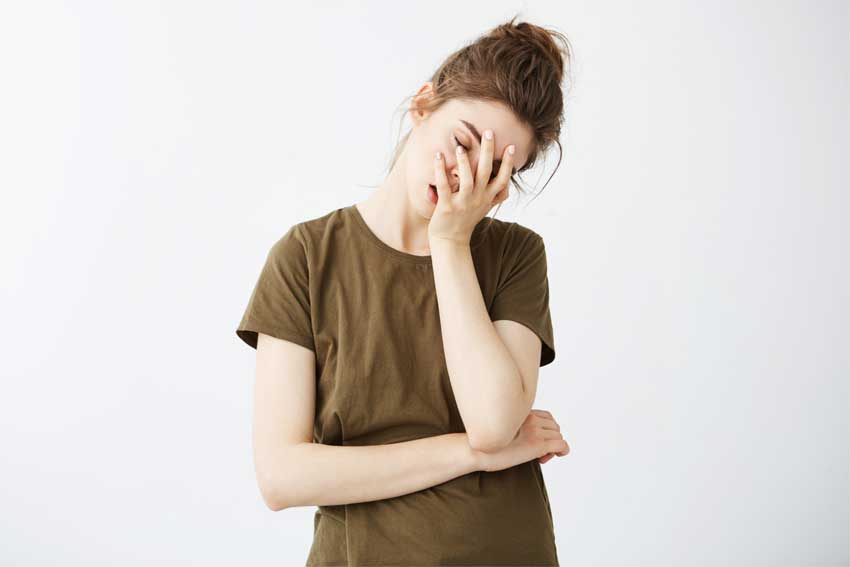Why Am I So Tired Quiz
Have you noticed lately that you’re always tired, no matter how many hours you spend in bed? Maybe it’s time to get rid of the bad habits that are often neglected and responsible for fatigue.
Advertisement

Why Am I Always Tired Quiz
You do not drink enough water
Although water is essential to all of the body’s vital processes, many people neglect it.
They do not know how wrong they are: several studies have shown that chronic dehydration affects mood, significantly increases fatigue and reduces alertness. That is why it is recommended to drink 2 to 3 liters of water a day, and even more if you are doing intense physical training.
You have nutritional deficiencies
Several nutrients – including iron, zinc, calcium, magnesium and B-complex vitamins are important to the chemical balance of the brain.
A deficiency in any one of these nutrients can lead to a decrease in sleep quality and thus a feeling of fatigue. In the case of persistent fatigue, it may therefore be appropriate to do a complete blood test to detect nutrient deficiencies.
You do not exercise enough
Several studies have shown a correlation between lack of exercise, fatigue and low cortisol levels.
This quickly leads to a vicious circle: fatigue discourages the individual from practicing physical activity, which reinforces the feeling of fatigue. It is recommended to practice the equivalent of at least 1 hour of fast walking per day.
You do not eat enough in the morning
It is recognized that eating in the morning is beneficial for physical and cognitive performance.
The glucose deprivation caused by fasting for several hours leads to a drop in blood glucose, which is quickly followed by disturbances in brain function: attention is notably slowed down.
Starting the day early without a snack can therefore explain a feeling of fatigue throughout the morning.
You are too much of a perfectionist
Perfectionism is a personality trait that can quickly lead to burn-out.
Unrealistic goals, fear of failure and excessive self-criticism are all factors directly linked to poor sleep and constant fatigue.
If you are in this situation, several tips are available to you: establish priorities (and stick to them), organize your time…
You disrupt your sleep on weekends
Every Monday, it is the same story: you feel tired and have trouble getting up. You feel like you have only managed to get a few hours of sleep. It’s not just a feeling: it seems that Sunday night is the least conducive to falling asleep and restoring sleep.
This is simply due to the disruption of the sleep rhythm caused by the two days of rest: for many people, Friday and Saturday nights are an opportunity to go to bed late. Your sleep routine is disrupted and your body reacts to that.
You use your cell phone in bed
Looking at your phone, tablet or electronic reader in bed is not recommended if you want to get a good night’s sleep.
The light emitted by these devices slows down the production of melatonin (sleep hormone). The direct action of the light delivered by a screen stimulates the visual pathways and acts on the internal biological clock.
Looking at the screen of an electronic device before going to bed reduces the quality of sleep. In the long term, this proves harmful and can cause significant sleep disorders, which severely affect daily life. A possible solution: use filters that block the blue light emitted.
You consume too much caffeine during the day
Caffeine, which is found in coffee, tea, chocolate, energy drinks and soft drinks, should be avoided before going to bed. It persists in the body for 3 to 5 hours and disrupts sleep cycles.
One study showed that consuming a caffeinated beverage between 0 and 6 hours before bedtime significantly reduced sleep duration. In fact, even when consumed 6 hours before bedtime, it would result in a loss of almost an hour of sleep!
You consume alcohol at night
You think alcohol makes it easier to fall asleep? It may seem so, but it actually reduces the quality of sleep considerably.
In fact, drinking after dinner can cause the first sleep cycle, called the quiet wakefulness cycle. Alcohol also causes regular awakenings due to adrenaline secretions, and disrupts sleep cycles because it blocks the entry of tryptophan to the brain.
In addition, because it dehydrates, the person frequently wakes up in the middle of the night to drink a glass of water. Sleep is therefore less regenerative and less restful.


